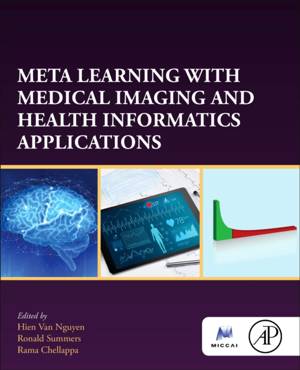
En raison d'une grêve chez bpost, votre commande pourrait être retardée. Vous avez besoin d’un livre rapidement ? Nos magasins vous accueillent à bras ouverts !
- Retrait gratuit dans votre magasin Club
- 7.000.000 titres dans notre catalogue
- Payer en toute sécurité
- Toujours un magasin près de chez vous
En raison de la grêve chez bpost, votre commande pourrait être retardée. Vous avez besoin d’un livre rapidement ? Nos magasins vous accueillent à bras ouverts !
- Retrait gratuit dans votre magasin Club
- 7.000.0000 titres dans notre catalogue
- Payer en toute sécurité
- Toujours un magasin près de chez vous
Meta Learning with Medical Imaging and Health Informatics Applications
172,45 €
+ 344 points
Description
Meta-Learning, or learning to learn, has become increasingly popular in recent years. Instead of building AI systems from scratch for each machine learning task, Meta-Learning constructs computational mechanisms to systematically and efficiently adapt to new tasks. The meta-learning paradigm has great potential to address deep neural networks' fundamental challenges such as intensive data requirement, computationally expensive training, and limited capacity for transfer among tasks. This book provides a concise summary of Meta-Learning theories and their diverse applications in medical imaging and health informatics. It covers the unifying theory of meta-learning and its popular variants such as model-agnostic learning, memory augmentation, prototypical networks, and learning to optimize. The book brings together thought leaders from both machine learning and health informatics fields to discuss the current state of Meta-Learning, its relevance to medical imaging and health informatics, and future directions.
Spécifications
Parties prenantes
- Editeur:
Contenu
- Nombre de pages :
- 428
- Langue:
- Anglais
- Collection :
Caractéristiques
- EAN:
- 9780323998512
- Date de parution :
- 30-09-22
- Format:
- Livre broché
- Format numérique:
- Trade paperback (VS)
- Dimensions :
- 190 mm x 235 mm
- Poids :
- 734 g

Les avis
Nous publions uniquement les avis qui respectent les conditions requises. Consultez nos conditions pour les avis.





